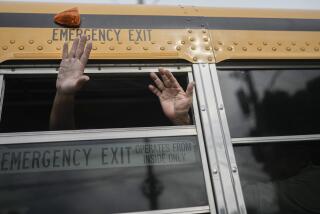Colombia Rebels Free 242 Police and Soldiers as Part of Accord
BOGOTA, Colombia — The night before, in a makeshift jungle pen, Luis Dario Santana threw all his old clothes and bad memories into a bonfire, wanting nothing more than to put 34 months of cruel captivity behind him.
Thursday afternoon, at a military base 60 miles south of Bogota, the Colombian capital, he quietly walked into his mother’s arms.
“It was very emotional, like when your first child is born,” Carmen Rosa said after being reunited with her son. “He’s lost weight, and he’s disoriented, but we’ll see how we get on.”
Santana was one of 242 police and military prisoners released Thursday by the Revolutionary Armed Forces of Colombia, or FARC, as part of a landmark humanitarian accord meant to breathe new life into the country’s struggling peace process.
The rebel group turned the men over to Red Cross officials near a dusty southern hamlet called La Macarena, deep inside a Switzerland-size haven ceded to the rebels in 1998. That same year, the FARC overran the Miraflores military base, killing dozens of government troops and taking dozens of others hostage, Santana among them.
“He’s very quiet, he’s tranquil,” said Santana’s father, also named Luis.
The former captives began their day in a barbed-wire corral under a FARC banner reading, “Freedom is obtained through the struggle.” After speeches and revolutionary hymns played by guitar-toting rebels, they filed through lines of heavily armed FARC fighters into Red Cross custody. The men then boarded buses and were shuttled to a nearby airfield. From there they were flown to a military base in Tolemaida, about 60 miles to the north, where their families waited.
Pale but smiling, many of the men carried plastic bags containing photographs and letters sent by loved ones during their months in captivity. Others told of being chained to trees or led by leashes.
The mass release marked the final phase of a historic prisoner swap signed by government and rebel envoys June 2. Since then, the FARC has handed over 55 ailing government troops in exchange for 14 of their own men who were being held in state prisons.
Both sides have hailed the accord as a weighty advance after 2 1/2 years of on-again, off-again peace talks.
“This proves peace is possible,” President Andres Pastrana told his war-weary nation when the prisoner exchange was signed.
However, ordinary Colombians say they are losing patience with the negotiations, and much of their ire is directed at the FARC, which continues to kidnap and massacre civilians despite weekly peace meetings with government representatives.
For its part, the FARC insists that the government has largely ignored its request for sweeping social reforms.
The release “is an eminently humanitarian act but of little consequence for the peace process,” said Rodrigo Losada, a political analyst at Bogota’s Javeriana University. The FARC views Pastrana as weak, Losada said, and is simply waiting out his term, which is due to end in a year.
“I don’t see any progress in the future,” Losada added. “Things could even get worse.”
With Thursday’s grand gesture, the FARC seemed to be hoping for a publicity coup. But the event was overshadowed by related news that Colombians found even more riveting: the decision by South American organizers to suspend the Copa America soccer tournament, which Colombia was to host.
The announcement came after the Monday kidnapping of Hernan Mejia, vice president of Colombia’s football federation, apparently by FARC gunmen. Pastrana responded by calling for a soccer truce among his country’s warring factions, but South American soccer officials were unmoved and asked for a change of venue.
On Thursday afternoon, Mejia’s family said he had been released, but it was unclear whether tournament organizers would return the event to its original host country.
Colombians, avid soccer fans who already feel stigmatized by their country’s violent reputation, were crushed. Television broadcasters quickly launched a national campaign to ask Copa America officials to reconsider. And in an impromptu address, Pastrana called the organizers’ decision a “slap in the face of our hospitality and our dignity.”
The thought of losing the tournament also generated a flash of national contempt toward the FARC.
Guerrilla groups are “the enemy of Colombia, and we have to understand [the situation] that way,” business leader Sabas Pretelt told reporters curtly.
Back in Tolemaida, police officer Fernando Rodriguez was impervious to the political turbulence surrounding his release.
“I feel immense happiness. It can’t be described,” he said after 32 months in jungle camps eating mostly pasta and lentils. Asked for his opinion of the rebel army, he said, “I think they’re trying to get some international attention, but they are still my enemy.”
More to Read
Sign up for Essential California
The most important California stories and recommendations in your inbox every morning.
You may occasionally receive promotional content from the Los Angeles Times.










